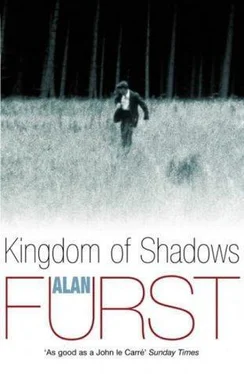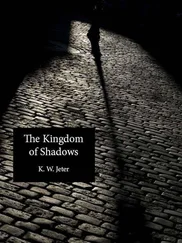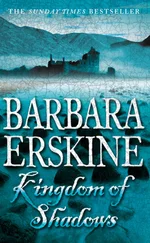Alan Furst - Kingdom of Shadows
Здесь есть возможность читать онлайн «Alan Furst - Kingdom of Shadows» весь текст электронной книги совершенно бесплатно (целиком полную версию без сокращений). В некоторых случаях можно слушать аудио, скачать через торрент в формате fb2 и присутствует краткое содержание. Жанр: Шпионский детектив, на английском языке. Описание произведения, (предисловие) а так же отзывы посетителей доступны на портале библиотеки ЛибКат.
- Название:Kingdom of Shadows
- Автор:
- Жанр:
- Год:неизвестен
- ISBN:нет данных
- Рейтинг книги:5 / 5. Голосов: 1
-
Избранное:Добавить в избранное
- Отзывы:
-
Ваша оценка:
- 100
- 1
- 2
- 3
- 4
- 5
Kingdom of Shadows: краткое содержание, описание и аннотация
Предлагаем к чтению аннотацию, описание, краткое содержание или предисловие (зависит от того, что написал сам автор книги «Kingdom of Shadows»). Если вы не нашли необходимую информацию о книге — напишите в комментариях, мы постараемся отыскать её.
Kingdom of Shadows — читать онлайн бесплатно полную книгу (весь текст) целиком
Ниже представлен текст книги, разбитый по страницам. Система сохранения места последней прочитанной страницы, позволяет с удобством читать онлайн бесплатно книгу «Kingdom of Shadows», без необходимости каждый раз заново искать на чём Вы остановились. Поставьте закладку, и сможете в любой момент перейти на страницу, на которой закончили чтение.
Интервал:
Закладка:
It occurred to Morath that, when all was said and done, he hadn’t actually lied to the Czech customs officer. He’d said he was going to look at woodland; well, here he was, looking at it. In the distance, two pops, and, a moment later, a third.
When Pavlo returned, he said only, “Well, we should be getting on our way.” What needed to be done was done, why talk about it. The two of them walked in silence, and, a few minutes later, they saw the bridge. A narrow, rickety old thing, the water sucked into deep eddies around the wooden poles that held it up, the surface maybe ten feet below the walkway. As Morath watched the bridge, it moved. The far end was sharp against the sky-a broken shard of railing thrust out toward the Hungarian side of the river. And, by moonlight, he could just make out the blackened char pattern on the wood, where the part that had been set on fire-or dynamited, or whatever it was-had fallen into the water.
Morath was already so sickened inside at what Pavlo had done that he hardly cared. He’d seen it in the war, a dozen times, maybe more, and it brought always the same words, never spoken aloud. Pointless was the important one, the rest never mattered that much. Pointless, pointless. As though anything in the world might happen as long as somebody, somewhere, could see the point of it. A rather black joke, he’d thought at the time. The columns riding through the smoking villages of Galicia, a cavalry officer saying pointless to himself.
“They’ll have a way to get across,” Pavlo said.
“What?”
“The people who go back and forth across the border at night. Will have a way to do it.”
He was probably right, Morath thought. A boat, another bridge, something. They worked their way toward the bank of the river, were within a few meters of it when they heard the voice. A command. In Russian, or maybe Ukrainian. Morath didn’t speak the language but, even so, the intention was clear and he started to stand up. Pavlo grabbed him by the shoulder and forced him down, into the high reeds along the riverbank. “Don’t do it,” Pavlo whispered.
Again the voice, mock polite, wheedling. We wouldn’t hurt a fly.
Pavlo tapped his lips with his forefinger.
Morath pointed behind them, at the relative safety of the forest. Pavlo thought it over, and nodded. When they started to crawl backward, somebody shot at them. A yellow spark in the woods, a report that flattened out over the water. Then a shout in Russian, followed, rather thoughtfully, by a version in Hungarian, fuck you, stand up being the general idea, followed by a snicker.
Pavlo picked up a stone and threw it at them. At least two guns responded. Then a silence, then the sound of somebody lurching through the underbrush, a crash, an oath, and a raucous bellow that passed for laughter.
Morath never saw where it came from-the briefcase? — but a heavy, steel-colored revolver appeared in Pavlo’s hand and he squeezed off a round in the general direction of the noise.
That wasn’t funny. That was unconscionably rude. Somebody screamed at them, and Morath and Pavlo went flat as a fusillade whizzed over the reeds. Morath made a hand sign, stay still. Pavlo nodded, he agreed. From the darkness, a challenge- come out and fight, you cowards. Followed by shouted dialogue between two, then three voices. All of them drunk, mean, and very angry.
But that was it. Pavlo’s single shot had made an eloquent statement, had altered the social contract: sorry, no free killing tonight. It took a long time, thirty minutes, of yelling, shooting, and what Morath guessed were meant to be intolerable insults. Still, Pavlo and Morath managed to tolerate them, and, when the gang went away, knew enough to wait the requisite fifteen minutes for the final shot, when they sent somebody back to ruin the victory celebration.
4:40 A.M. The light pearl gray. The best moment to see and not to be easily seen. Morath, wet and cold, could hear birds singing on the Hungarian side of the river. He and Pavlo had walked upstream for a half hour, soaked by the heavy mist, looking for a boat or another way across, found nothing, and returned to the bridge.
“Whatever they use, they’ve hidden it,” Pavlo said.
Morath agreed. And this was not the morning for two strangers to walk into an isolated village. The Czech police would be interested in the murder of a Polish taxi driver, the Ukrainian gang more than curious to know who’d been shooting at them the night before. “Can you swim?” Morath said.
Very slowly, Pavlo shook his head.
Morath was a strong swimmer, and this would not be the first time he’d been in a fast river. He’d done it in his teens, with daring friends. Jumped into spring current holding a piece of log, floated downstream until he could fight his way to the far shore. But, this time of year, you had only fifteen minutes. He’d seen that too, during the war, in the Bzura and the Dniester. First an agonized grimace at the cold, next a silly smile, then death.
Morath would take his chances; the problem was what to do with Pavlo. It didn’t matter what he felt-he had to get him across. Strange, though, a lot of folklore on this issue. Endless foxes and roosters and frogs and tigers and priests and rabbis. A river to be crossed-why was it always the cunning one that couldn’t swim?
And there weren’t any logs. Maybe they could break off a piece of the burnt railing, but they’d know that only when they got to the far end of the bridge. Morath decided to abandon his satchel. He was sorry to lose the copy of Bartha, he would find a way to replace it. For the rest, razor and socks and shirt, good-bye. The Ukrainians could have it. As for Pavlo, he unbuckled his belt and looped it through the handle of the briefcase. “Put your passport in your mouth,” Morath said.
“And money?”
“Money dries.”
Flat on his belly, Morath worked his way across the bridge. He could hear the water as it rushed past, ten feet below, could feel it-the damp, chill air that rose from heavy current. He did not look back, Pavlo would either find the nerve to do this or he wouldn’t. Crawling over the weathered planks, he realized that a lot more of it had burned than was evident from the shore. It smelled like old fire, and his lamb’s-wool sweater from a shop on the rue de la Paix-“Not that green, Nicky, this green”-already caked with mud, was now smeared with charcoal.
Long before he reached the end, he stopped. The support poles had burned, part of the way anyhow, leaving black sticks to hold up the bridge. Morath realized he would be going into the river a little earlier than he’d planned. The bridge trembled and swayed each time he moved, so he signaled back to Pavlo to stay where he was and went ahead on his own.
He reached a bad place, hung on, felt himself start to sweat in the cold air. Would it be better to dive in here? No, it was a long way to the other shore. He waited for the bridge to stop wobbling, then curled his fingers around the edge of the next board and slid forward. Waited, reached out, pulled, and slid. Resting his face against the wood, he saw a pair of white egrets flying toward him, just above the water, then heard the beating of their wings as they passed above him.
By the time he reached the end-or as close as he could get to it, beyond a certain point the wood was so burned away it wouldn’t hold a cat-he had to take a minute to catch his breath. He motioned for Pavlo to come along. As he waited, he heard voices over the water. He turned, saw two women, black skirts held above their knees, standing in the river shallows and staring at him.
When Pavlo arrived, they studied the far bank-a good forty yards away. In the growing daylight, the water was brown with earth swept down from the mountain streams. Lying next to him, Pavlo was the color of chalk.
Читать дальшеИнтервал:
Закладка:
Похожие книги на «Kingdom of Shadows»
Представляем Вашему вниманию похожие книги на «Kingdom of Shadows» списком для выбора. Мы отобрали схожую по названию и смыслу литературу в надежде предоставить читателям больше вариантов отыскать новые, интересные, ещё непрочитанные произведения.
Обсуждение, отзывы о книге «Kingdom of Shadows» и просто собственные мнения читателей. Оставьте ваши комментарии, напишите, что Вы думаете о произведении, его смысле или главных героях. Укажите что конкретно понравилось, а что нет, и почему Вы так считаете.












